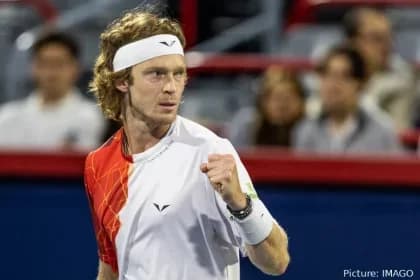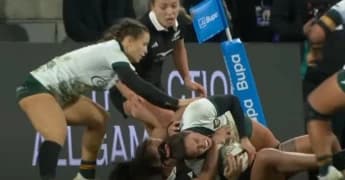Rublev's Withdrawal Sparks Debate on Player Commitment in Tennis

In the high-stakes world of professional tennis, the clash between commitment and strategy unfolds as players like Rublev prioritize season-end glory while younger talents like Musetti seek to seize their shot at success.
In the dynamic realm of professional tennis, athletes are continually balancing the intricacies of competition and strategy, especially as the season draws to a close. Andrey Rublev’s recent exit from the Moselle Open has ignited a heated exchange with Italy’s Lorenzo Musetti, who challenged the legitimacy of the Russian's involvement in the tournament.
Currently taking part in the ATP Finals in Turin, Italy, Rublev secured his place in this esteemed year-end tournament following the withdrawal of former world number one Novak Djokovic due to injury issues. This development clearly worked in favor of the player from Moscow; however, it also sparked discussions regarding his dedication to the Moselle Open, where his departure was surrounded by controversy.
The situation unfolded in Metz, where Rublev reached the quarterfinals after defeating Musetti with scores of 6-4 and 6-3 in the round of 16. However, once it was confirmed that he had secured his spot in the ATP Finals, Rublev chose to withdraw from the tournament entirely, citing his qualification as the main reason. This decision did not please Musetti, who openly voiced his disappointment regarding Rublev's actions.
Musetti's remarks, shared in a recent interview, underscored the increasing tension surrounding player participation in end-of-season tournaments. “If a player isn't committed to going the distance and vying for the title, then they are merely occupying a spot that could belong to someone else who has more at stake,” Musetti stated. The Italian's argument holds validity in various ways: in a highly competitive sport like tennis, every tournament position is subject to keen scrutiny, with many believing that every match should carry significance, particularly when so much is at risk.
In response to the criticisms, Rublev was swift and composed. The world number nine stood by his choice, highlighting the necessity of focusing on long-term objectives in a season that already requires immense physical and mental stamina. “Everything is relative,” Rublev remarked, recognizing the difficulties of managing multiple high-pressure tournaments alongside the demanding ATP schedule. He clarified that his choice was not a slight against the Moselle Open or his competitors but was instead aimed at ensuring he remained in optimal condition for the season's crowning achievement – the ATP Finals.
The exchange between Rublev and Musetti highlights a larger concern that has become more pronounced as the tennis season progresses. As the ATP Finals stand as the ultimate goal for players, many grapple with the challenge of balancing their physical exhaustion and injuries while striving to remain competitive in other tournaments.
Rublev's choice to pull out of the Moselle Open after guaranteeing his spot in the Finals showcases an increasing tendency among elite players to focus on high-stakes, end-of-season events rather than other tournaments that may hold less significance, whether regarding rankings or prize money.
Undoubtedly, there is no ideal answer to this issue. Musetti’s viewpoint resonates with many competitors who are still vying for ranking points, chances, and the opportunity to make a significant impact at a major tournament. For these players, every event is crucial, and the idea that a place in the tournament could be occupied by someone with different priorities can be quite exasperating. Conversely, Rublev’s perspective underscores the tough realities of a demanding schedule and the necessity to conserve energy for the larger goals ahead.
As the 2023 season comes to a close, discussions like this highlight the pressures that today’s elite tennis players face. With the ATP Finals currently in progress, all attention will be focused on how players such as Rublev handle their performance and stamina, while Musetti and others pursue their own goals. What is evident, however, is that the dialogue regarding tournament commitment and priorities is far from finished—both players and fans will continue to navigate the intricate dynamics of contemporary tennis.
Ultimately, Rublev's choice may have been a calculated one, yet it introduces an additional layer of intrigue to the ongoing story of the sport, where the decisions made by players are often far more complex than they appear.






